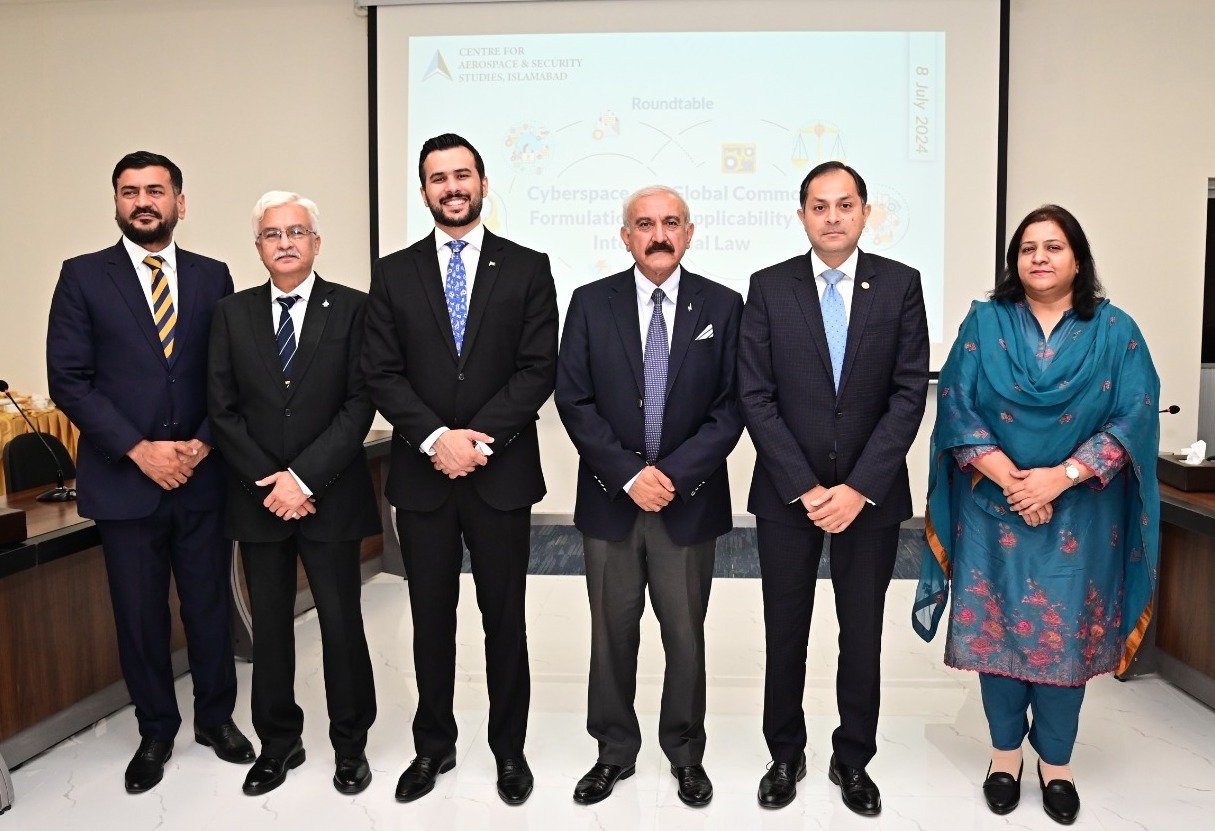
Spokesman Report
Islamabad:The Centre for Aerospace & Security Studies (CASS), Islamabad, conducted a roundtable on the ‘Cyberspace as a Global Common: Formulation and Applicability of International Law.’
Air Marshal Zahid Mehmood (Retd), Director (National Security) at CASS, set the stage for the discussion by outlining critical issues surrounding the governance of cyberspace. Drawing parallels to natural assets outside national jurisdictions such as oceans and outer space, he highlighted the unique challenges and responsibilities faced in regulating cyberspace as a ‘global common’. Air Marshal Mehmood highlighted several international initiatives working to establish norms for cyberspace governance, including efforts of the Internet Corporation for Assigned Names and Numbers (ICANN); the United Nations’ Group of Governmental Experts (GGE); and the World Wide Web Consortium (W3C). Additionally, he referenced legal frameworks like the Budapest Convention on Cybercrime; the African Union Convention on Cyber Security and Personal Data Protection; and NATO Cooperative Cyber Defence Centre of Excellence (CCDCoE)’s Tallinn Manual 2.0 that are shaping the landscape of cyber law. Despite these efforts, he lamented that cyberspace remains largely unregulated, underscoring the pressing need for enhanced international cooperation.
Mr Jamal Aziz, Executive Director, Research Society of International Law (RSIL), remarked that discussions on great power rivalry, geopolitics, and the multipolar world often remained superficial, pointing out that the real confrontation was now unfolding in the technological domain, particularly in cyberspace. He highlighted that international standard setting works in tandem with strategic and domestic institutions, a process that needs sharp focus by Pakistan. Additionally, he noted that domestic laws were not systematically coordinated, leading to ineffective domestic and international responses. Mr Aziz also expressed concern over the basic nature of agreed-upon cyber security norms and the complexity of cyber warfare, including issues of attributing cyber-attacks and managing non-state actors. He underscored the importance of developing strong domestic legal frameworks in the digital domain, noting that countries like the US and China were advancing regulations to set the pace for global standards in their interest.
Mr Khawaja Mohammad Ali, a Cyber Security, Data Privacy, and Digital Forensics Expert, was of the view that cyberwarfare must be recognised as the fifth domain of warfare, highlighting its importance for national security. He cautioned that future sanctions could stem from cyberspace governance, underscoring the need for Pakistan to establish a presence in cyberspace and participate in its governance to avoid remaining vulnerable to cyber threats. He pointed out the importance of the global supply chain in cyberspace, indicating the need for sophisticated cybersecurity measures. He mentioned that cybersecurity, once a buzzword around 2003-04, is now being seriously implemented by organisations across Pakistan. However, he expressed concerns that Pakistan’s cybersecurity policy, currently under review in Parliament, does not address emerging technologies such as AI and cloud computing, emphasising the necessity of actionable policies rather than mere paper plans. Mr Ali also highlighted the need for securing institutions and critical infrastructure from adversaries. He concluded by stressing the importance of enhancing cyber-diplomacy; establishing international linkages to strengthen Pakistan’s position in global cyberspace governance; and focusing on indigenous development in cybersecurity solutions.
Discussants Dr Zunera Jalil and Dr Kashif Kifayat from Air University also shared their views on the subject.
In his Concluding Remarks and Vote of Thanks, Air Marshal Javaid Ahmed (Retd), President CASS, Islamabad highlighted that nowadays, decision-making was entirely data-dependent, hence, it was crucial to secure data. He commended ongoing efforts within academia to bolster the cyber ecosystem through R&D. Discussing global technology dynamics, he opined that Pakistan would soon need to make strategic choices between aligning with Western or Eastern technological standards. President CASS stressed the importance of supporting existing areas of excellence within the country rather than focusing solely on vulnerabilities. He urged government policymakers to acknowledge and invest in Pakistan’s human resources to enhance national cybersecurity capabilities.





